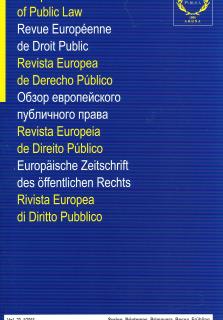
Un nouvel état?
(A New State?)
1/ The State nowadays faces profound changes, that can be assembled behind the idea of a “return to Greece”. On the one hand, we observe a “return to polytheism”: plurality of authorities that come to compete with the State from above (globalisation), from below (regionalisation) or from within (independent agencies). This polytheism is being translated, in the framework of the legal order, as a pluralism of norms. On the other hand, we can refer to a “return to the agora”, with the development of representative democracy (principle of citizen participation, public debate, soft law), or that of judicial debates on great questions of society. 2/ However, behind this renewal, we observe some permanent phenomena. Instead of regressing, the need for public affairs is being extended. The private sector itself is also being “conquered” by general interest purposes, such as protection of the environment or fair trade. Besides, the State retains a major role in the new methods of public action, including the organisation of public debates. It also retains the executive function. In the final analysis, the State retains the role of the ultimate legal constituent. 3/ These evolutions raise for the State six challenges, to which jurists should respond: cohesion, legitimacy, citizenship, effectiveness, responsibility and sovereignty.
1/ L’Etat connaît aujourd’hui de profondes mutations, que l’on peut regrouper derrière l’idée d’un “retour à la Grèce”. D’une part, on observe un “retour au polythéisme”: pluralisme des autorités qui viennent concurrencer l’Etat par en haut (globalisation), en bas (régionalisation) ou en son sein (agences indépendantes). Ce polythéisme se traduit, dans l’ordre juridique, par un pluralisme des normes. D’autre part, on peut parler d’un “retour à l’agora”, avec le développement de la démocratie représentative (principe de participation des citoyens, débat public, normes souples), ou celui des débats judiciaires autour de grandes questions de société.
2/ Toutefois, derrière ce renouvellement, on observe des permanences. Loin de régresser, le besoin de chose publique s’étend. Le secteur privé lui-même est gagné par les finalités d’intérêt général, qu’il s’agisse de la protection de l’environnement ou du commerce équitable. En outre, l’Etat conserve une place majeure dans les nouvelles méthodes de l’action publique, y compris dans l’organisation des débats publics. Il conserve également la fonction exécutive. En dernière analyse, l’Etat conserve le rôle de constituant juridique ultime. 3/ Ces évolutions soulèvent pour l’Etat six défis, auxquels les juristes devraient apporter des réponses: la cohésion, la légitimité, la citoyenneté, l’efficacité, la responsabilité et la souveraineté.





















